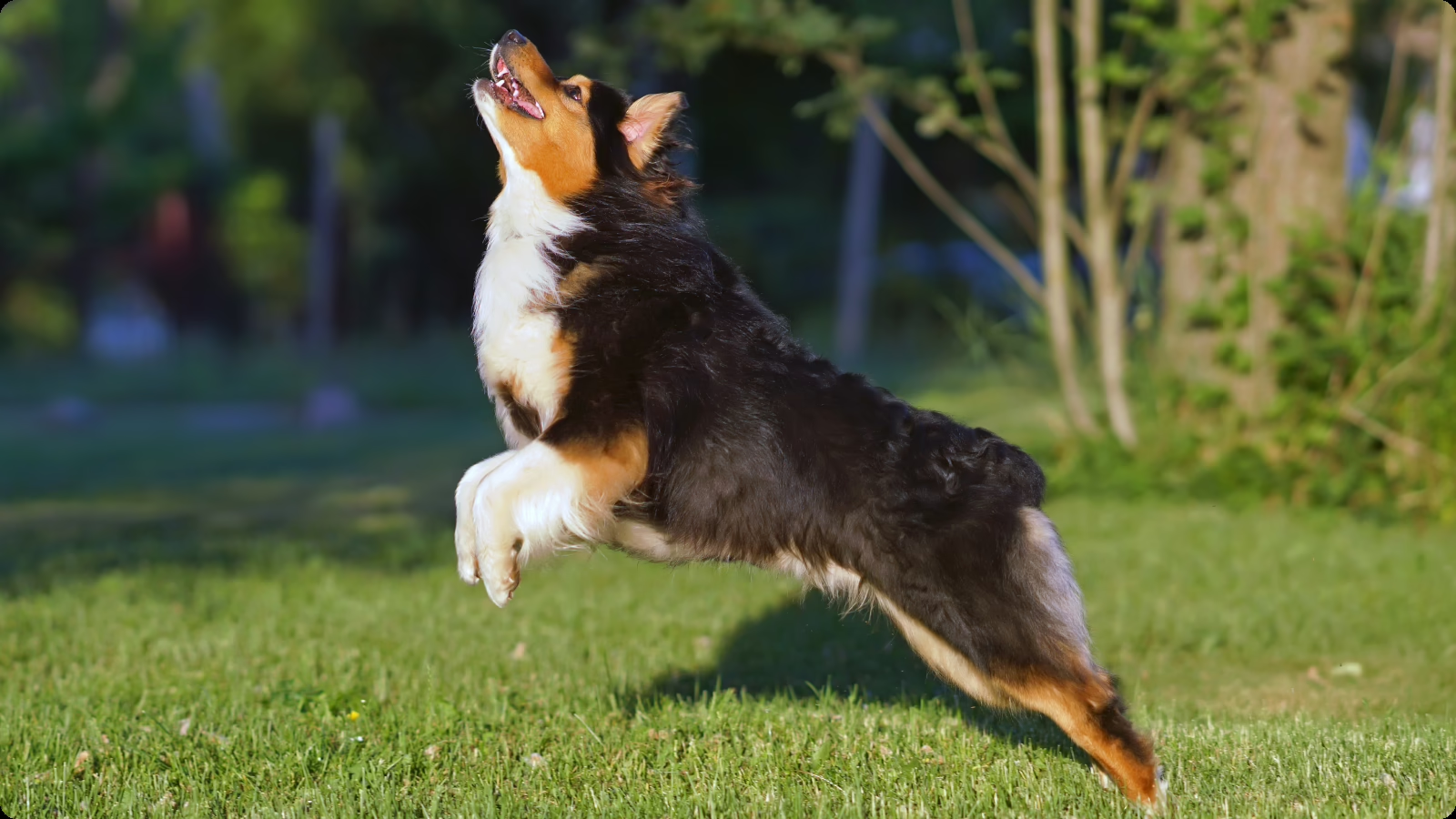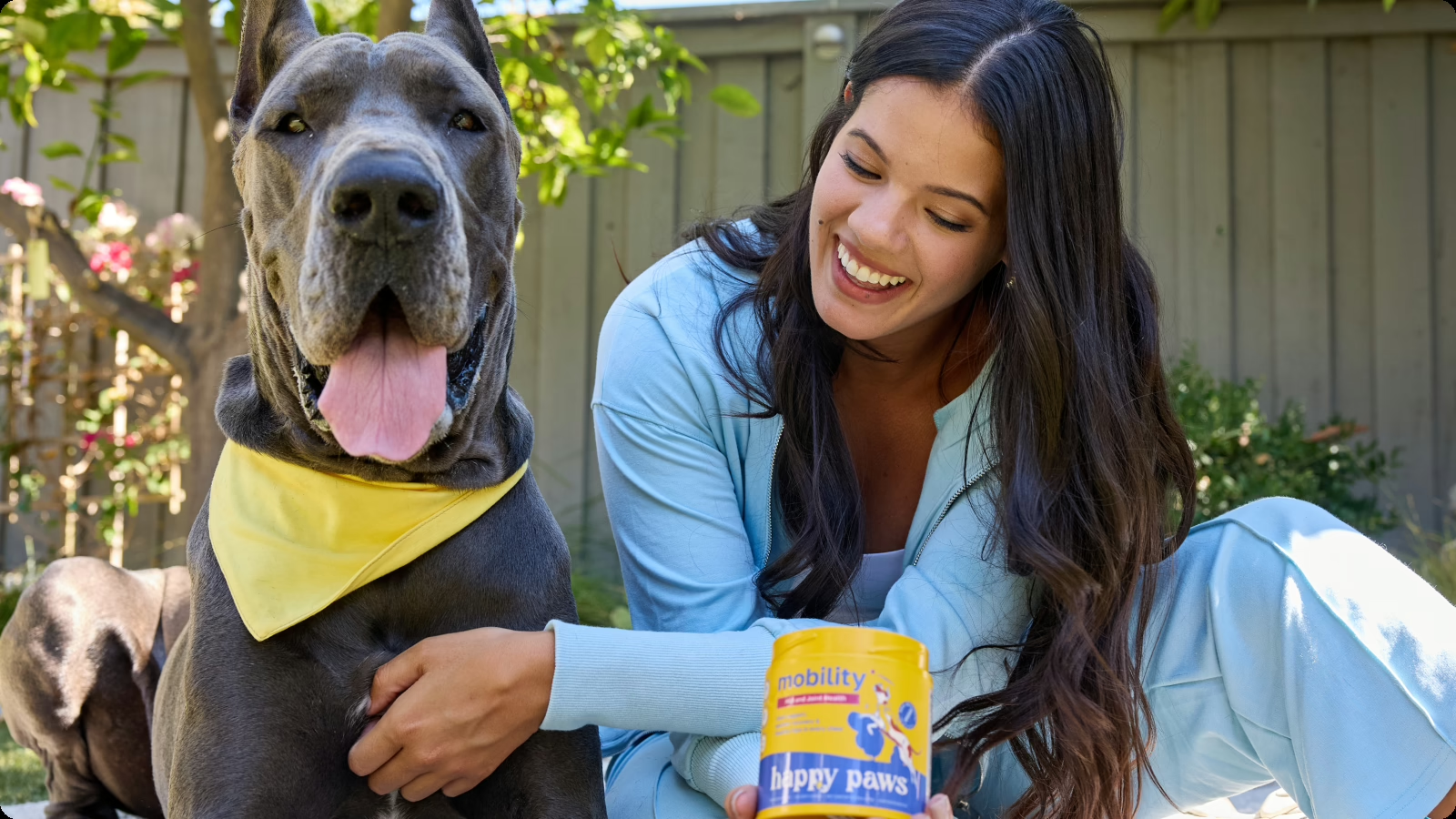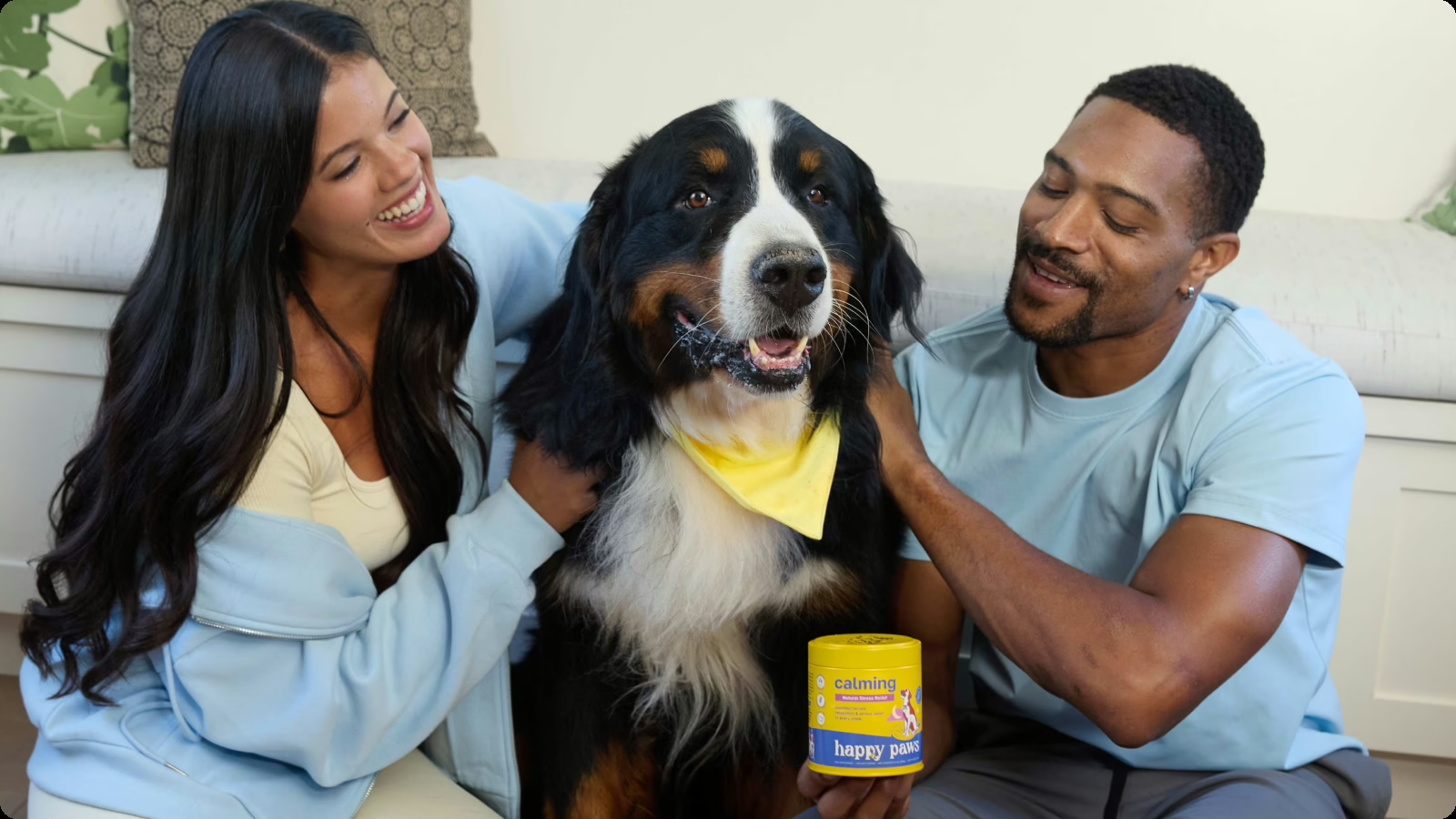The Apollo of Dogs
Tall, regal, and goofy, the Great Dane is a sight to behold. This dog has a massive head with floppy ears, a long, confident smile, and a tongue that consistently hangs out of their mouth. But those aren’t the first things you see when a Great Dane strides up to you. If you’re sitting down, you’ll likely be eye-to-eye with this miniature-horse-sized dog. They are the tallest dog breed, in fact, and weigh up to 175 pounds!
But don’t worry—this giant is gentle. The Great Dane is a sensitive love bug that remains a loyal lap dog even when they’re spilling off the couch. Their towering, massive frame contrasts with a soft, affectionate demeanor, and their calm confidence slowly morphs into a silly goofiness, reserved solely for family.
At Happy Paws, we’re dedicated to helping all dogs, from purebreds to certified mutts, live their happiest, healthiest lives. We’ve designed our dog supplements to target a range of trouble spots in your dog’s health—many of which include common issues for a Great Dane.
In this article, we’ll explore the history of this Herculean dog, provide some information and tips on how to care for them, and help you decide which supplements are best for your tender titan, the Great Dane.
Quick Facts
Origin: Germany
Size: Extra Large
Breed Group: Working
Lifespan: 7–10 years
Coat: Short hair—minimal grooming recommended
Temperament: Gentle, laid-back, shy & goofy
Exercise Needs: Like any dog, the Great Dane requires mild to moderate exercise. But these dogs aren’t very high-energy. You can treat your Great Dane to a long walk or hike, or let them freely gallop for fenced-in playtime.
Training: Obedience training can help your Great Dane get a little more acclimated to their surroundings, especially if that space involves fine china at tail height. But don’t worry, they’ll love training! Great Dane puppies flourish when there’s work to be done, and obedience training lets them flaunt their intelligence. Continue daily training well into adulthood to help keep your Great Dane’s mind sharp.
Dog Health: Great Danes’ sheer size invites a couple unique health challenges. Common problems this breed faces include hip dysplasia, digestive issues, and cardiovascular complications. We’ll discuss how to address each below.
Happy Paws for Great Danes
Enrich your Great Dane’s health with high-quality, tasty supplements like these!
| Type of Happy Paws Supplement | Best for … |
| Cognitive Dog Chews | Promoting brain health & mental clarity |
| Digestive Health Dog Chews | Supporting healthy digestion & a strong gut flora. |
| 10-in-1 Multivitamin Dog Chews | Giving your pupper a daily dose of essential vitamins, minerals & other nutrients. |
| Hip & Joint Dog Chews | Soothing common symptoms of joint dysplasia & inflammation. |
| Probiotic Dog Chews | Restoring the healthy bacteria in your dog’s digestive system. |
In-Depth Look at These Popular Supplements
Whether you have enough space on the couch or not, a Great Dane dog can make a wonderful addition to your family or single pet-parent household (with the proper training, of course). This lovable, loyal breed never runs out of compassion and affection for those who know them best.
So, they’re pretty tough not to spoil! If you’d like to return the love and spoil your Great Dane daily, do so with healthy treats that actually taste like treats. Our high-quality, tail-waggin’ dog supplements use an array of all-natural, organic ingredients to enrich your dog’s physical and mental health, while satisfying their taste buds.
Here are a few dog supplements to help you care for your dog.
Cognitive Dog Chews: Great Danes are intelligent, intuitive animals, always watching with a curious gaze. Our Cognitive Dog Chews help sharpen their minds well into their golden years. These vegan, chicken-flavored chews use an array of vitamins, minerals, and other nutrients to promote optimal brain health and fight against cognitive decline.
Digestive Health Dog Chews: Our Digestive Health Dog Chews use powerful, all-natural probiotics and enzymes to enrich your dog’s gut health and strengthen their digestive system. These healthy, tasty dog treats offer a delicious pumpkin flavor that spoils your pet’s palate while fortifying their gut flora.
10-in-1 Multivitamin Dog Chews: Our 10-in-1 Multivitamin Dog Chews use multiple essential nutrients to strengthen your dog’s daily health and give them a well-rounded supplement. One vegan, lamb-flavored dog treat introduces ten critical nutrients to keep your dog healthy, happy, and active.
Hip & Joint Dog Chews: Soothe the symptoms of joint dysplasia with our Hip & Joint Dog Chews! Packed with a blend of joint-friendly ingredients, this dog supplement helps reduce inflammation and support joint health, thanks to compounds like glucosamine, chondroitin, and hyaluronic acid.
Probiotic Dog Chews: Made with powerful antioxidants, probiotics, and superfoods, our Probiotic Dog Chews help strengthen your dog’s digestive system, while supporting their gut and bowel health.
Common Great Dane Health Concerns
Like other extra large dog breeds, Great Danes are often prone to common health issues like these:
Elbow & Hip Dysplasia: According to the American Kennel Club (AKC), many medium-sized to extra-large dog breeds are susceptible to elbow and hip dysplasia. This issue arises from birth when the bone in a joint is misshapen, causing an awkward fit in your dog’s joints. This defect can often lead to joint pain, osteoarthritis, limping, and trouble standing up.
Digestive Issues: Large to giant breeds commonly have digestive problems, like bloating. These issues can stem from their diet, lifestyle, or genetics.
Cardiovascular Disease: Because of their massive size, Great Danes are genetically predisposed to cardiovascular problems. So, feeding them a vitamin-rich, nutrient-packed diet is essential to help fortify their heart health.
About the Great Dane Breed
One of the biggest mysteries in canine history revolves around how a beloved German hound got a Dutch name like “Great Dane.” Scholars can’t piece together how the “Apollo of Dogs,” who descended from ancient Mastiffs and helped German aristocrats hunt wild boars, traded in its identity for a Dutch name. Since the scholars still seem perplexed, that’s a mystery for none other than Scooby-Doo—one of the most popular fictional Great Danes.
Though they were once formidable watchdogs and hunters, Great Danes today have pretty much shed that temperament—at least on the inside. Their towering frame and compact build confirm generations of hard, strenuous work. And their high intelligence pushes Great Danes to be smart, reliable dogs.
But their goofy side spills out somewhat unintentionally. They are just a big dog in a small world—a predicament that can lead to several awkward, graceless blunders. After all, there’s a reason the lovable, clumsy cartoon dog, Marmaduke, was a Great Dane.
Their Temperament
Great Danes are fiercely loyal and love being the center of attention. These dogs will climb on your lap (whether they fit or not) and beg for pets, kisses, and praises. They like keeping you in their line of sight, so get ready to have a miniature horse following you around while you cook, clean, or lounge.
Early socialization and training can help these dogs remain calm, cool, and confident around pets and small children. Just make sure to train your Great Dane properly, as they may accidentally knock down a child, elderly family member, or friend. They are gentle giants, but they can also lack some grace.
How to Care for This Breed
If you can handle the size, Great Danes are actually fairly easy dogs to care for. They are quick learners, so training sticks; and they have short, smooth hair, so shedding isn’t a major concern. But there are a few tips to help keep your Great Dane happy, healthy, and lively, from their puppy years and well into their golden years.
Puppy Training
Great Danes are eager to please, so many pick up training rather quickly. With obedience training, Great Dane puppies can tap into their working dog instincts and learn how to maneuver in tight spaces and around small children or the elderly.
Moderate Exercise
Like other extra-large dogs, Great Danes are susceptible to a number of health conditions, including joint pain and cardiovascular complications. So, it’s best to moderate their exercise to low-impact workouts, like long walks, short jogs, and nature hikes.
Quality Time
Great Danes deeply cherish their owners, often squeezing for a place on your hip. You can validate this affection with proper quality time, where you’re actively engaged and giving your Great Dane loads of attention—they seriously love being in your spotlight.
Happy Paws: High-Quality Dog Supplements
Keeping your dog happy, healthy, and active shouldn’t feel like a full-time job. At Happy Paws, we’ve designed our dog treats with the best ingredients and flavors possible (our dogs definitely approve!). We’ve made sure these treats are certified organic, non-GMO, and third-party tested for purity, letting you spoil your dog easily with healthy, tasty dog treats.
FAQ
Is a Great Dane a good family dog?
Great Danes can be excellent family dogs if they’ve been socialized with other dogs, pets, and children early in their lives. As with any dog, it’s best to start training when the dog is a puppy. This early start will help your dog understand how to behave appropriately around children and elderly family members or friends.
What breeds make a Great Dane?
Great Danes have been around for a couple hundred years, but they’re thought to be descendants of English Mastiffs and Irish Wolfhounds—two similarly massive, formidable breeds.
Does a Great Dane bark a lot?
Great Danes are known for their deep belly barks. Though, they don’t let this bark out often, mostly to alert you or get your attention.
How do you give a Great Dane health supplements?
You can give your dog a Happy Paws health supplement in several ways. First, we’ve designed these supplements as dog treats, so you can give them to your pupper as a reward for good behavior. Or, you can add it to your dog’s kibble; they make a pretty tasty topper, too.





